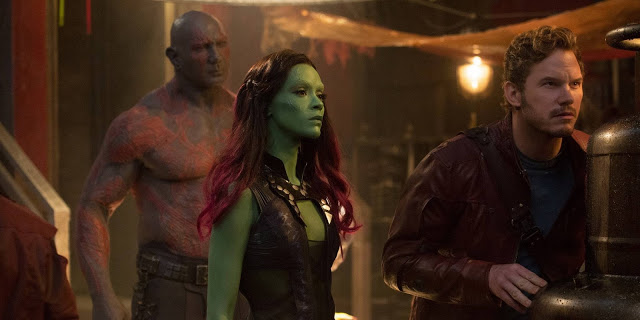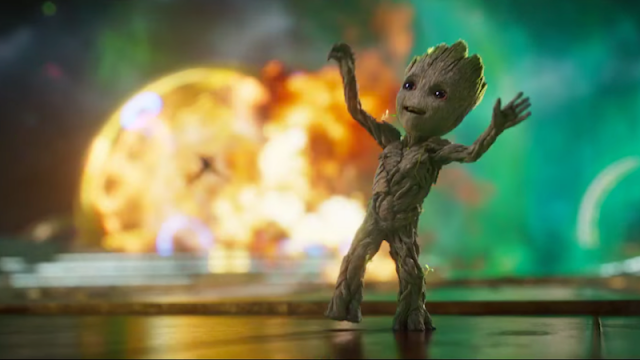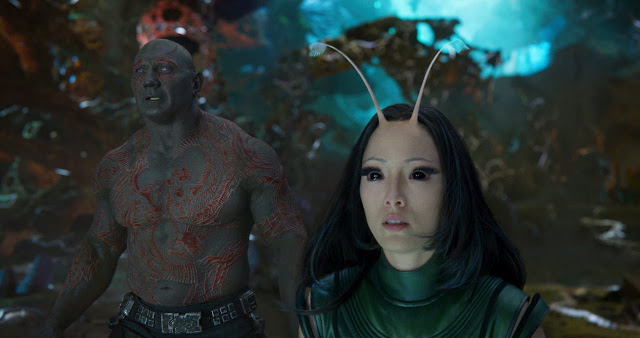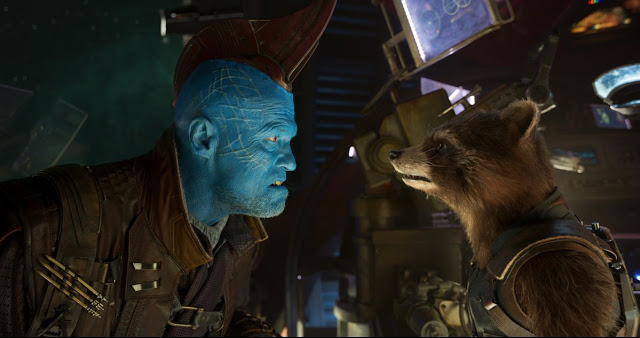In the middle of the hectic opening set piece of Guardians of the Galaxy Vol.2, the green-skinned alien Gamora reproaches two of her squabbling colleagues: “Can we put the bickering on hold till after we survive the massive space battle?” It’s a sensible request that comes from the troupe’s most sensible member, but at the risk of mansplaining (human-splaining?), allow me to point out the flaw in Gamora’s logic. Whereas the typical superhero extravaganza centers on its high-octane action sequences, the first Guardians of the Galaxy made its mark by inverting the formula; it emphasized writing and character, pushing its passable pyrotechnics into the background. With this franchise, the bickering isn’t ornamental—it’s the main attraction.
That canny focal adjustment made the original Guardians a welcome antidote, a rejuvenating tonic that helped offset the fatigue brought on by the glut of superhero pictures constantly invading the American multiplex. The challenge now facing James Gunn, returning as both writer and director, is how to reconcile the bracing freshness of the first installment with the rigid demands of the cinematic universe. The standard operating procedure for comic-book sequels is simply to take what worked the first time around, then blow it up to even greater dimensions, but spunky originality isn’t so easily amenable to magnification. How do you bottle lightning twice?
You don’t, really. There is a familiarity to this second go-round that is mildly disappointing, even if it was also inevitable. But once you adjust for the curve, you can appreciate Guardians of the Galaxy Vol. 2 for what it is: a fun, kinetic, overstuffed romp whose considerable pleasures overpower its numerous flaws. Unlike its predecessor, Guardians 2 hasn’t rewritten the studio playbook, but it has executed it with estimable dexterity and flair.
Take the movie’s title sequence. As with most entries in the Marvel Cinematic Universe—now on its fifteenth film, with two more coming later this year—Guardians 2 opens with an elaborate, FX-driven spectacle, as its heroes scramble to defeat a colossal space monster. But rather than concentrating on the main action, Gunn shunts the combat into the background, focusing instead on Baby Groot (voiced again by Vin Diesel, sort of), a miniaturized version of the giant tree-beast who ostensibly died at the end of the last film and whose only phrase remains “I am Groot”. As the normal-sized guardians run and leap and fight, this adorable critter plugs in a set of standing speakers and starts dancing to Electric Light Orchestra’s “Mr. Blue Sky”, gleefully oblivious to the life-threatening carnage taking place behind him.
It is tempting to greet this sequence—and the rambunctious movie that follows—with a glare of scorn rather than a bark of mirth. After all, irreverence tends to be less radical when it is rehearsed, and there is an undeniable degree of calculation accompanying Gunn’s approach. But watching Baby Groot slither and groove, my skepticism turned into joy. And as a whole, Guardians 2 similarly breaks down your defenses: It may be repetitive, but it demonstrates that repetition does not always result in tedium. That’s because its peculiar brand of blockbuster—a cocktail of underhanded humor, impudent banter, and carefully curated pop songs—is consistently delightful. You may have seen this movie before, but that doesn’t make it any less fun to re-watch.
Of course, not everything is the same; per the law of sequels, the film’s scope is bigger, its threats more daunting. And as is tradition, one of the characters must grapple with newly discovered parentage. Here, that internal struggle falls to Peter Quill (Chris Pratt, looking fit and fitting well), aka Star-Lord, the rascally rogue who seems to be a clear cinematic descendant of Han Solo. In fact, he learns early in Guardians 2 that his father is Ego (Kurt Russell, perfectly cast), a god-like humanoid who has built his own exotic planet. In bold strokes, Guardians 2 is a getting-to-know-you picture, as Quill cautiously regards the father he’s never known and finds his loyalties divided between his metaphorical old family and his literal new one.
But this is a Guardians of the Galaxy movie, which means that plot is incidental. It’s really another hangout flick, only one with tremors of dramatic and emotional nuance smuggled inside the relentless slinging of jokes and insults. Following a raucous first act, Gunn splits his characters off into their own mini-arcs, a conventional move that nevertheless yields a number of inspired pairings. Quill and Gamora (Zoe Saldana) continue to explore their quasi-romance, the former’s impishness clashing fruitfully with the latter’s steeliness. Gamora herself is being hunted by her resentful sister, Nebula (Karen Gillan), leading to an antagonistic sibling rivalry that grows more complicated with time. Also present on Ego’s planet is Drax (an excellent Dave Bautista), the muscle-bound brute with the boisterous laugh; he develops a strange connection with Mantis (Pom Klementieff), Ego’s helper who can use her bug-like antennae to perceive others’ emotions. And elsewhere, the twisted raccoon Rocket (voiced by Bradley Cooper, with the director’s brother Sean Gunn standing in) trades barbs with the blue-skinned bounty hunter Yondu (Michael Rooker), each continuously one-upping the other and perhaps bonding over their shared narcissism and self-loathing.
It’s a busy narrative, but it doesn’t feel cluttered, largely because Gunn’s writing is so smart and effortless. Scene after scene, he piles on the superhero clichés, only to then undercut them with vibrant, good-natured humor. A mission to plant a bomb suddenly turns into an onerous search for Scotch tape. A seeming supervillain has a stupid name. A reconnaissance assignment becomes a pained lesson in simple object recognition. A tender father-son moment revolves around a Looking Glass song. An emotionally intense scene crests with a cameo from David Hasselhoff. It’s all random and cute and bizarre, but most of all, it’s funny.
Which is critical, because as a superhero blockbuster, Guardians 2 still hasn’t figured out how to make space battle work. Gunn has a thoughtful eye, and some of the images that he composes—especially those on Ego’s colorfully weird world—have a striking, tactile beauty. But his action sequences still feel clunky and weightless, lacking in both spatial coherence and concrete physicality. Especially dispiriting is his decision to conclude the movie with yet another chaotic climax, where the heroes wage war against an intangible spectral force. Earlier in the film, the guardians are pursued by a clan of golden-skinned elites called the Sovereigns, who attack via remote-control drones; in one scene, the Sovereigns gather around their last remaining pilot, like nerdy teenagers cheering on a compatriot in a video arcade as he guns for the high score. It’s a playful twist, but it’s symptomatic of the detachment and intangibility that plague Gunn’s set pieces. If there’s no sense of actual danger, what’s the point?
Well, the point is what it’s always been with this franchise: the characters. And against all odds, what ultimately salvages Guardians 2 from the fate of MCU mediocrity is good old-fashioned corniness. There’s genuine feeling lurking beneath these wayward adventurers, a desperate desire for love and companionship. This is true not just in terms of romance but also in the more fraternal sense; the characters’ camaraderie may be expressed through mockery, but its true foundation is one of affection and loyalty. So when Drax draws a distinction between friends and family, he seems to be ripping off a cringeworthy line from the Fast and Furious films, yet the underlying sweetness makes it work. And when a major character dies—a rarity for the MCU, which is typically light on stakes—the survivors’ shared sadness hits home.
“I’m gonna make some weird shit,” Quill enthuses after discovering that he’s inherited Ego’s power to bend matter to his will. But while this off-kilter franchise remains largely segregated from the rest of the MCU—despite the whopping five post-credits scenes, there’s minimal teasing for future crossovers—Guardians of the Galaxy Vol. 2 isn’t quite as weird or as novel as Gunn might have hoped. Yet in embracing his characters’ more recognizable emotions, he’s still done something inspiring: crafted a silly superhero adventure with a functioning brain and a gigantic heart. It’s perhaps ironic that the movie’s most rousing needle drop is Fleetwood Mac’s “The Chain”, given that it’s a song about the band’s splintering relationships. “Chains keep us together,” the outro refrain goes. But here, our heroes act out of fidelity, not fear, and their devotion to one another is oddly moving. In other words, sometimes, we really are Groot.
Jeremy Beck is the editor-in-chief of MovieManifesto. He watches more movies and television than he probably should.





I think Beale is going to agree with your opinion of the opening scene. I adored it, for most of the reasons you pointed out! It was comical in the face of disaster. I had a great time watching this sequel and appreciate your review!
My pleasure, thanks for reading!
It was good, not great. 7/10, 8/10 if you get hit the right combination of butter on your popcorn.